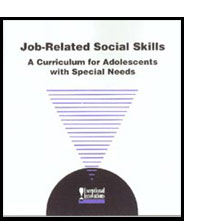|
This
comprehensive curriculum manual provides you with step-by-step
instructional procedures and activities for training social skills
needed for all jobs. Each of the 20 units contains a sample instructional
script, classroom activities, role play scenarios, overheads,
student assessments, and student handouts. Monitoring forms and
master class charts are also included in the 350-page manual.
The curriculum was successfully field tested
with students in general career education and vocational programs,
as well as with students with disabilities.
Table of
Contents
SECTION
ONE: INSTRUCTIONAL GUIDE
Chapter
1: Overview, 1
Socialization Training for Employment Preparation, 1
Why teach job-related social skills, 1
Program purpose and components, 1
How to Teach Job-Related Social Skills, 3
Instructional procedures, 4
Direct instruction, 4
Active participation, 5
Verbal rehearsal, 5
Visualization, 6
Modeling, 6
Role playing, 6
Simulation activities, 7
Performance feedback, 7
Reinforcement, 8
Mastery learning, 8
Self-management, 9
Monitoring the workplace, 9
Materials for instruction, 9
Scripted lessons, 9
Master class charts, 10
Student cue cards, 10
Simulation activities, 11
Videotape activities, 11
Group facilitation, 12
Selecting the group leader, 12
Selecting the students, 13
Setting up the group, 14
Preparing the group meetings, 15
Leading the group, 15
Putting it all together, 16
Chapter
2: Self-Management Strategies, 18
Self-Instruction, 18
Self-Questioning, 19
Self-Monitoring, 20
Self-Reinforcement, 21
Conclusion, 21
Chapter
3: Job-Related Social Skills Evaluation, 22
Job-Related Social Skills Assessment, 23
Job-Related Social Skills Surveys, 24
Videotape Evaluations, 26
Chapter
4: Monitoring Students on the Job, 42
Monitoring in the Workplace, 42
References, 49
SECTION
TWO: JOB-RELATED SOCIAL SKILLS
Skill 1 Ordering job responsibilities, 50
Skill 2 Understanding directions, 70
Skill 3 Making introductions, 88
Skill 4 Asking questions, 103
Skill 5 Asking permission, 118
Skill 6 Asking for help, 134
Skill 7 Accepting help, 149
Skill 8 Offering help, 165
Skill 9 Requesting information, 181
Skill 10 Taking messages, 196
Skill 11 Engaging in a conversation, 212
Skill 12 Giving directions, 227
Skill 13 Responding to compliments, 243
Skill 14 Giving compliments, 259
Skill 15 Convincing others, 275
Skill 16 Apologizing, 291
Skill 17 Accepting criticism, 307
Skill 18 Responding to a complaint, 323
Lesson 19 Student Job Reports and Job Support Groups, 340
Lesson 20 Networking and Problem Solving, 345
 Read an excerpt of this publication in PDF. Read an excerpt of this publication in PDF.
|
 Job Related Social Skills: A Curriculum for Students with Special Needs
Job Related Social Skills: A Curriculum for Students with Special Needs 
 Read an
Read an